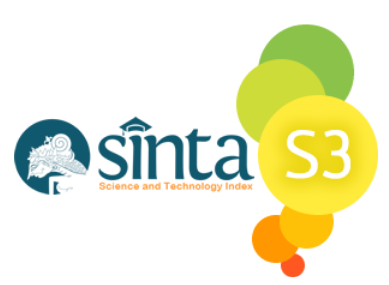VISITING PROFESSOR PROGRAM: IS IT EFFECTIVE IN IMPROVING STUDENTS’ COMPETENCE?
Abstract
Universities all around the globe have been working hard on internationalization to improve the quality of education, students, and alumni, along with the demand of a more dynamic world. Universitas Brawijaya (UB), as one of the renowned campuses in Indonesia, has also implemented the internationalization strategy to realize its vision and mission as a World Class, Entrepreneurial University. As part of the internationalization strategy, UB runs a “3 in One” program involving visiting professors from universities abroad, practitioner lecturers, and internal lecturers in education, research, and community service activities. This study aimed to evaluate the implementation of the “3 in One” program, emphasizing lecturers’ perspectives as program implementers. We employed a mixed-method study with a qualitative and quantitative approach. The research population was all lecturers involved in the “3 in One” Program. Samples were chosen using stratified random sampling. The research instrument was a questionnaire adapted from (a) the Guidebook of World Class Professors by the Directorate General of Resources for Science, Technology, and Higher Education of the Ministry of Research, Technology, and Higher Education and (b) the Term of Reference (TOR) of the 2019 “3 in One” Program of UB, Student Evaluation of Educational Quality (SEEQ), and (c) semi-structured interviews. It is expected that our findings could become a reference for stakeholders of UB to evaluate and improve the program. In addition, the findings could also become a creative reference for the government and other universities in Indonesia to adopt a similar program according to institutional needs.
Keywords
Full Text:
PDFReferences
Alfaro, I.J., Boullosa, A.P., Andreu-Besó, J.V., De Lamo, J., Sobrado, L., Sanz, R., Arias, J.M. (2009). Student opinion of the information policies of four Spanish universities with regard to erasmus and other international programmes. Higher Education in Europe, 34(3-4), 313-332.
Ary, D., Jacobs, L.C., and Razavieh, A. 2002. Introduction to Research in Education. Belmont: Wadsworth.
Bogdan, R. C. & Biklen, S. K. 1998.Qualitative Research for Education. Singapore: Allyn & Bacon
Coffey, M. & Gibbs, G. (2001). The Evaluation of the Student Evaluation of Educational Quality Questionnaire (SEEQ) in UK Higher Education. Assessment & Evaluation in Higher Education, 26(1), 89-93.
Edelstein, R.J. & Douglass, J.A. (2012). Comprehending the International Initiatives of Universities: A Taxonomy of Modes of Engagement and Institutional Logics. Center for Studies in Higher Education: Research and Occasional Paper Series. Retrieved from https://escholarship.org/uc/item/8r23m9r7, on January 29th, 2020).
Guyadeen, D. & Seasons, M. (2016). Evaluation Theory and Practice: Comparing
Program Evaluation and Evaluation in Planning. Journal of Planning
Education and Research, 38(1), 98–110. https://doi.org/10.1177/0739456X16675930.
Haussler, S.C. (2003). Finnish Students’ Perceptions of a Visiting Professor.
Journal of Professional Nursing, 19(2), 99-105.
Jessani, N.S. Hendricks, L., Nicol, L., Young, T. (2019). University Curricula in Evidence-Informed Decision Making and Knowledge Translation: Integrating Best Practice, Innovation, and Experience for Effective Teaching and Learning. Frontiers in Public Health, 7, Article Number 313, December 3rd, 2019.
Lesch, A., Pisano, J., Kapila, Y.L. (2014). The student perspective: international exchange programs. The Journal of the Michigan Dental Association, 96(6),
-34.
Maryam, N.S. (2016). Mewujudkan Good Governance Melalui Pelayanan Publik.
Jurnal Ilmu Politik dan Komunikasi, VI(1), 1-18.
McDavid, J.C. & Hawthorn, L.R.L. (2006). Program Evaluation & Performance
Measurement: An Introduction to Practice. London: SAGE.
“Menristekdikti: PMMB "Link and Match" Pendidikan Tinggi dan Industri". (2019). Kompas.com. Retrieved from https://edukasi.kompas.com/read/2019/03/20/19250161/menristekdikti-pm mb-link-and-match-pendidikan-tinggi-dan-industri on January 23th, 2020.
Miles, M.B., Huberman, A.M., & Saldaña, J. (2014). Qualitative data analysis: A
methods sourcebook (3rd ed.). London, UK: SAGE.
Palinkas, L.A., Horwitz, S.M.,Green, C.A., Wisdom, J.P., Duan, N., Hoagwood, K. 2015. Purposeful Sampling for Qualitative Data Collection and Analysis in Mixed Method Implementation Research. Administration and Policy in Mental Health and Mental Health Services Research. (42)533–544
Payne, K. (2019). The Future Workplace: 7 Trends to Watch Out For in 2019.
Thrive Global. Retrieved from
https://thriveglobal.com/stories/the-future-workplace-7-trends-to-watch-out- for-in-2019/ on January 28th, 2020.
Pfotenhauer, S.M., Jacobs, J.S., Pertuze, J.A., Newman, D.J., Roos, D.T. (2013).
Seeding change through international university partnerships: The
mit-portugal program as a driver of internationalization, networking, and innovation. Higher Education Policy, 26(2), 217-242.
Sugandi, B. (2019). Internasionalisasi Universitas. DetikNews. Retrieved from https://news.detik.com/kolom/d-4728743/internasionalisasi-universitas on January 23rd, 2020.
“Vision and Mission”. (n.d.). Retrieved from
https://ub.ac.id/about/vision-and-mission/ on January 28th, 2020.
DOI: https://doi.org/10.18551/erudio.8-2.13
Refbacks
- There are currently no refbacks.
Copyright (c) 2022 Erudio Journal of Educational Innovation

This work is licensed under a Creative Commons Attribution 4.0 International License.












